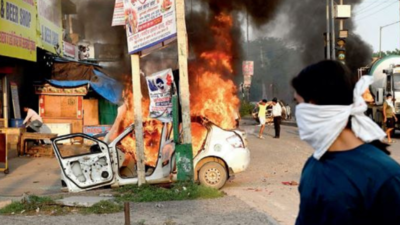
by Shaimin Raja 10 August 2023
The persecution of Muslims in India is an alarming human rights concern that has intensified in recent years. India’s Muslim population, constituting approximately 14% of the total, has been subjected to discrimination, violence, and harassment by both Hindu extremist groups and state authorities. The distressing incident of the Haryana riots in July 2023 serves as a stark reminder of this escalating issue. The Haryana riots unfolded as a series of communal clashes originating in the Nuh district of Haryana, a northern Indian state, before spreading to adjacent regions. The catalyst for the violence was a religious procession organized by the Vishva Hindu Parishad (VHP), a Hindu nationalist group, through a predominantly Muslim area. Tensions escalated due to the provocative nature of the procession, marked by loud music and inflammatory slogans chanted by VHP members. The situation was further aggravated by the dissemination of a video on social media, wherein a suspect previously wanted for the murder of two Muslim men declared his intent to join the procession, exacerbating the already fragile atmosphere.
The confrontation spiraled into violence as both sides engaged in clashes using stones, sticks, and even firearms. Law enforcement attempted to intervene, but their efforts were insufficient against the overwhelming mobs. Tragically, the clashes resulted in the loss of lives, including two police officers and three civilians, while leaving dozens injured. The upheaval extended to nearby areas such as Gurugram, Faridabad, and Palwal, prompting the imposition of curfews, internet suspensions, and the deployment of a substantial number of paramilitary and police forces to restore order. Despite these measures, the tension endured, creating a volatile environment for days. In the aftermath of the riots, the Haryana government’s actions have drawn significant concern. Reports indicate that over 300 Muslim homes and businesses in Nuh district have been demolished since August 3, 2023, ostensibly under claims of illegal encroachments or involvement in the violence. However, local residents dispute these assertions, accusing authorities of arbitrarily targeting their properties without due process or prior notice. The demolition campaign has left countless families destitute, robbing them of their livelihoods and sources of income. For many families, these properties held generations of memories and were supported by valid ownership or tenancy documentation.
The demolition drive is just one facet of the post-riot violence and vandalism experienced by Muslims in Nuh and neighboring areas of Haryana. Eyewitness accounts and media reports have documented the burning and damaging of Muslim-owned properties, including mosques, shops, hotels, and vehicles, by Hindu mobs during the clashes. In some instances, law enforcement and administrative bodies failed to adequately protect these properties or prevent the attacks, with suggestions of their complicity in some cases. Additionally, Muslims have faced threats, abuse, and ostracization from certain Hindu groups that wrongfully blamed them for the violence. The destruction of Muslim properties has resulted in profound loss and trauma for the victims, many of whom have yet to receive any form of compensation or justice from the government. This has led some individuals to be falsely implicated or arrested in connection to the riots, while others have been forced to abandon their homes, fearing further violence. These acts of destruction and displacement have cultivated a pervasive sense of insecurity and alienation within the Muslim community, diminishing their sense of belonging in their own homeland.
The incidents of property destruction and demolition underscore a disturbing pattern of persecution and discrimination against Muslims in India. These actions not only violate legal and moral principles but also endanger India’s democratic values and cultural diversity. They foment animosity and resentment among different religious communities, undermining the pursuit of peace and coexistence. The Haryana riots are not isolated occurrences; they reflect deeply entrenched hostilities between Hindus and Muslims that have endured since the nation’s partition in 1947. The partition led to a massive migration of people along religious lines, and India has since experienced sporadic outbreaks of sectarian violence, claiming countless lives. This ongoing persecution is exacerbated by the rise of Hindu nationalism and extremism in recent years. The ruling Bharatiya Janata Party (BJP), led by Prime Minister Narendra Modi, has pursued policies that have marginalized and alienated the Muslim minority.
Controversial legislation such as the Citizenship Amendment Act (CAA), the National Register of Citizens (NRC), and the Uniform Civil Code (UCC) has disproportionately affected Muslims, sparking concerns about unequal treatment under the law. Moreover, the support and patronage given to radical Hindu groups like the Vishva Hindu Parishad (VHP), Rashtriya Swayamsevak Sangh (RSS), and Bajrang Dal have perpetuated a hostile narrative that vilifies Muslims as invaders, terrorists, and cow-killers.
The persecution of Muslims in India represents a grave violation of their fundamental rights and human dignity. This trend also poses a serious threat to India’s secular democracy and multicultural fabric. Urgent action is needed from the Indian government to safeguard the rights of Muslim and non-Hindu citizens and prevent further injustice. Accountability for events such as the Haryana riots must be established, and efforts to foster dialogue, understanding, and acceptance among different religious groups must be prioritized. These measures are essential for India to honor its commitment to “unity in diversity” and to uphold the ideals envisioned by leaders like Mahatma Gandhi.
